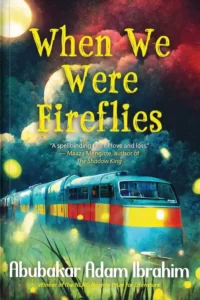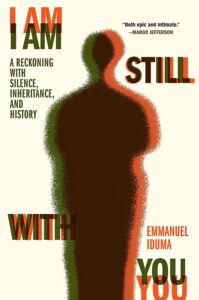In his debut full-length poetry collection Exodus, Gbenga Adeoba is contending with loss in its wholeness and heaviness. The book navigates migration and exile, the displacement borne from wars, enslavement, and destruction. While the political inclination is blatant, the poems focus on the victims, the sufferers, the survivors, the witnesses. His landscape spans both the recent past and further back, centuries ago, from Nigeria to Italy to Haiti to Benin.
Like the rest of the people in this book, the 26 Nigerian women in “Half Acre of Water” faced an almost impossible reality before succumbing to the sea:
They had begun to drown
those many years ago—in homes
that were no longer homes—
Choices like that faced by these women is the sort of difficult circumstance that the poet maps in this collection. His keen sense of empathy is on display. That he manages to meld immediacy and precision with tenderness and empathy is a testament to his skill.
Adeoba does not explain, not really; he shows but does not hold your hand. He takes the role of a witness, charting a grief so broad and sheer, interwoven with history and memory. His words are declarative, as in “Seafarers”:
The refrain of this water
says something is imminent,
says loss is upon us.
He shows perplexities with measured control and composure, as though he cannot afford to be harrowed also. One is reminded of a doctor telling his patient of their terminal diagnosis–a detached storyteller with the simple yet daring assignment of pointing “humanity to the loss of itself.” It is clinical and immense, soft and powerful. And he does so with such musicality.
Still, Adeoba lets down the walls of the impersonal narrator, albeit briefly, at a few points in the collection. He gives us a glimpse into his own past with the poems about his grandfather. “Thresholds” lovingly recalls “the music of his lore, riffling the air/ like the lifting of birds.” “A Funeral Hymn in Falsetto” recounts the tenth year since his grandfather’s passing, since “the earth shifted an inch”; he is still ridden by “sighs” and “elegies,” by memory. And there are “Nostalgic bits” of his own history in “Gbogi Street.”
Memory and history are concrete, inescapable even, in these poems. They are full of remembering. For the refugees in “All the Little Lights Going Out,” “memory is a cargo floating on seawater.” In “Here Is Water,” the shore becomes “a space for things intimate and lost.” In “War Notes,” he emphasizes the tangibility of history, its residue and its place in contending with loss.
Adeoba calcifies the necessity of memory as a lens through which history is examined: “Now, he is speaking of Zong,/ the memories, its handlers as well,” he writes in “A Short Essay on Drowning.” Perhaps it is due to the turbulence of the 1781 Zong Massacre, an occurrence so staggering, that the voice resorts to “thinking of lives in aggregates, beyond digits.”
Lesser-known histories are not excluded, as in the unreported shipwreck in “Middle Passage” that, like some other parts of the collection, may be intermingled with the poet’s own imagination.
Adeoba’s poetry is also preoccupied with the sea. But the sea, here, is more than an image. It is seductive, promising, an expanse of unfathomable depth with its “unfulfilled promises” (“Seafarers”). It is living, a reserve of forgotten names, lost dreams, “told and untold mishaps.” It is at once gentle and formidable. Somehow it is also refuge.
The Mediterranean in “What Birds Sing of in Libya” is “a grave wide enough for the numbers.” Water holds governance. Elsewhere, it is “ageless,” at once familiar and unknowable, unwaveringly impartial to the burdens of the passengers that want to cross its depths.
But there are slivers of hope throughout the collection. In “Middle Passage,” “slaves/huddled in the ship cell as a cluster, singing,/knitting their singsong into the thick of that hurricane.” In “The Morning After,” “these little ones. . . singing and jumping in the rain–/a respite from the dust and their parched hearts.”
Though Adeoba’s language is unflinching, it is also gentle in the way empathy has to be. Musical, it coaxes again and again into hard recounts of survival, hope, trauma, fear, resignation and shared history. It is almost ironic, the sweetness of his words, the gravity in what they imply. In “Leaving Agadez,” we are presented the deep uncertainty in charting what “Chorography” calls the “unknown,” a reality this collection swells with.
Exodus sounds urgent despite Adeoba’s reaching past centuries. With a voice that blends elegiac, contemplative, and matter-of-fact verses, he ropes us in to tread along. It feels like a revolt against forgetting, conscious or otherwise, like he is saying that we are not allowed to. And he does not let us.
More Reviews in Open Country Mag
—Sankofa by Chibundu Onuzo Review—What Does It Mean for a Woman to Reclaim Herself?
—The Fugitives by Jamal Mahjoub Review—A Beautiful Novel of Sudanese Music and Displacement
—How Beautiful We Were by Imbolo Mbue Review—Oil Politics in a Tussling Village
—Sacrament of Bodies by Romeo Oriogun Review—An Originative Work by an Epochal Poet
—The Rinehart Frames by Cheswayo Mphanza—An Exciting Achievement in Intertextual Poetry
—Nsukka Is Burning Review—How a Small University Town Influenced Nigerian Literature
—The Origin of Name by Adedayo Agarau Review—Narrating Grief
—20.35 Africa Vol. III Review—The Pain Won’t Go Away
—Waterman by Echezonachukwu Nduka Review—A Sobering Stare at the World
—The Geez by Nii Ayikwei Parkes Review—Threading Family, Love, & Race
—Transcendence by Wana Udobang Review—Woman in the Light






One Response